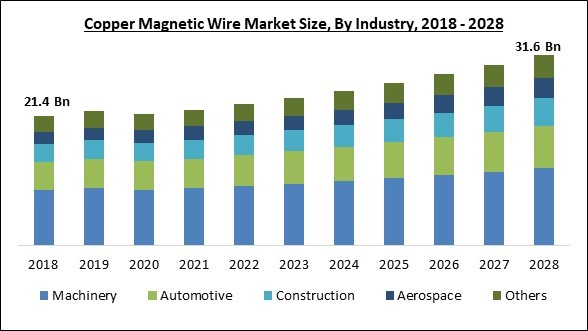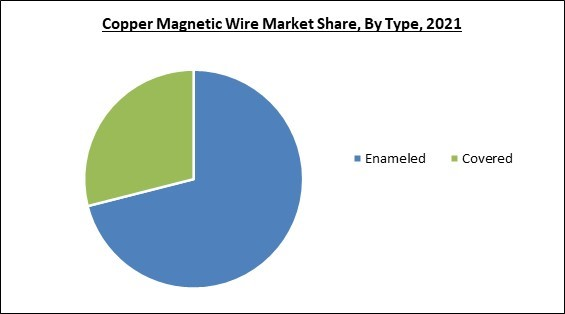The Global Copper Magnetic Wire Market size is expected to reach $31.6 billion by 2028, rising at a market growth of 5.1% CAGR during the forecast period.
A form of copper wire with thin insulation made of polymers like polyurethane, polyesterimide, polyamidimide, and other polymers is known as copper magnetic wire. It can be insulated by wrapping the wire in the tape using materials such as paper, fiberglass, and polymer. Electricity generators, motors, solenoids, small and big transformers, and other devices have cores wound with copper magnetic wire.
Due to its significantly lower resistance than aluminum, another material frequently used to make magnet wire, copper is employed extensively in this industry. Copper wire is also stronger and less likely to break in the tight twists of core wrapping. Copper is also a better option for heavy electric gear with a high electricity voltage because it has a greater melting point.
These and other properties make the copper magnetic wire popular for transformer windings, inductors, speakers, hard disk actuators,electromagnets, motors,and other devices. There are mainly two types of magnetic wires, copper and aluminum. Out of these, copper wire is used more across various industries. The skin effect, which concentrates current on the conductor's surface, may impact how the current is distributed across a segment of wire transmitting currents ofhigh frequency (over 10 kHz).
Even higher current densities areachievablewhen active cooling is supplied, proportionally to how well the cooling works, by blowing air or flowing water. To obtain equivalent DC resistance, an aluminum wire needs to have a cross-sectional area that is 1.6 times larger than a copper wire. As a result, copper magnetic wires help equipment like electric motors run more efficiently.
The market research report covers the analysis of key stake holders of the market. Key companies profiled in the report include Sumitomo Electric Industries, Ltd., LS Cable & System Ltd., Schwering & Hass Elektrodraht GmbH (SYNFLeX Elektro GmbH), Proterial, Ltd (Hitachi, Ltd), SAM Dong Co., Ltd, Elektrisola Dr. Gerd Schildbach GmbH & Co. KG, Rea Magnet Wire Company Inc., IRCE S.p. A., Dahrén Group (Liljedahl Group AB) and Hpw Metallwerk GmbH.
A form of copper wire with thin insulation made of polymers like polyurethane, polyesterimide, polyamidimide, and other polymers is known as copper magnetic wire. It can be insulated by wrapping the wire in the tape using materials such as paper, fiberglass, and polymer. Electricity generators, motors, solenoids, small and big transformers, and other devices have cores wound with copper magnetic wire.
Due to its significantly lower resistance than aluminum, another material frequently used to make magnet wire, copper is employed extensively in this industry. Copper wire is also stronger and less likely to break in the tight twists of core wrapping. Copper is also a better option for heavy electric gear with a high electricity voltage because it has a greater melting point.
These and other properties make the copper magnetic wire popular for transformer windings, inductors, speakers, hard disk actuators,electromagnets, motors,and other devices. There are mainly two types of magnetic wires, copper and aluminum. Out of these, copper wire is used more across various industries. The skin effect, which concentrates current on the conductor's surface, may impact how the current is distributed across a segment of wire transmitting currents ofhigh frequency (over 10 kHz).
Even higher current densities areachievablewhen active cooling is supplied, proportionally to how well the cooling works, by blowing air or flowing water. To obtain equivalent DC resistance, an aluminum wire needs to have a cross-sectional area that is 1.6 times larger than a copper wire. As a result, copper magnetic wires help equipment like electric motors run more efficiently.
COVID-19 Impact Analysis
Due to the relaxation in various regulations and the easing of supply chain networks, the demand for copper magnetic wires has increased once again. The intensity of thepandemic, however, greatly decreased as a result of the advent of several vaccines. Due to this, enterprises participating in the market for copper magnetic wire have fully reopened, and industrial sector activity has also increased. Additionally, some businesses have already displayed considerable indications of recovery. In summation, the pandemic had a negative impact on the copper magnetic wire market.Market Growth Factors
Increasing demand in the automotive industry due to higher demand for electric vehiclesy
Copper magnetic wire demand is rising in response to the rising popularity of electric vehicles. It takes a huge amount of magnetic wire to power electric vehicles. Busbars, charging infrastructure, electric motors, and several other things all use copper magnetic wires. A pure electric vehicle can use over a mile of copper magnetic wiring in its stator windings, according to a study by Copper Development Association Inc. Thus, the need for copper magnetic wires is ultimately driven by the rising production of electric vehicles, which further propels the growth of the market.Expanding demand for electricity worldwide
Power consumption in the industrial, domestic, and commercial sectors has increased. Current AC-powered power transmission lines are being converted to DC-powered lines to increase power transmitting limits. As more power distribution initiatives take form around the world, it would increase the need for supporting structures like transformers, which use copper magnetic wires. Therefore, due to increased energy consumption and the development of the renewable energy sector, the copper magnetic wire market is expected to rise significantly during the forecast period.Market Restraining Factors
Fragile and cracked insulation of wires
Magnetic wires used for winding are typically generated in the form of a very thin strand. This allows for more winds to be woven into the armatures of generators and motors. However, some regions of the magnetic wires change their physical features because of the high temperatures and the tensional stress they are subjected to in such areas. As a direct consequence, the insulation covering the magnet wires begins to shatter. This can also happen on rare occasions when the varnishing resin used on the wires is of lower quality. These drawbacks of the copper magnetic wires prevent their extensive use, which may negatively impact the market's growth.Type Outlook
Based on type, the copper magnetic wire market is categorized into enameled and covered. The covered segment procured a considerable growth rate in the copper magnetic wire market in 2021. The covered wire use tape made of paper, plastic, glass fiber, as well as other materials. Due to the superior insulation capability of thick tapes, these are frequently utilized for applications involving high voltages, like large transformers and motors. Furthermore, due to its excellent electrical properties in humidity and high temperatures, glass-fiber-covered wire is growing in popularity.Industry Outlook
On the basis of end user industry, the copper magnetic wire market is divided into automotive, machinery, aerospace, construction, and others. The machinery segment acquired the largest revenue share in the copper magnetic wire market in 2021. In this segment, copper magnetic wire is utilized in equipment for industries including conveyors, industrial electronics, pumps, and others. Copper magnetic wires have a good amount of strength compared to other wires. As the wires are sturdy and do not melt readily, they can be employed in the event of an electrical surge, wire overloads, or possibly line fluctuations.Regional Outlook
Region wise, the copper magnetic wire market is analyzed across North America, Europe, Asia Pacific, and LAMEA. The Asia Pacific region witnessed the maximum revenue share in the copper magnetic wire market in 2021. This growth in the Asia Pacific is explained by the region's quick economic development as well as the region's rapidly growing population and urbanization in nations like China, Vietnam, Indonesia, India, and others. For instance, China's manufacturing industry contributes significantly to national revenue. Moreover, the Chinese automotive sector is also one of the biggest in the world.The market research report covers the analysis of key stake holders of the market. Key companies profiled in the report include Sumitomo Electric Industries, Ltd., LS Cable & System Ltd., Schwering & Hass Elektrodraht GmbH (SYNFLeX Elektro GmbH), Proterial, Ltd (Hitachi, Ltd), SAM Dong Co., Ltd, Elektrisola Dr. Gerd Schildbach GmbH & Co. KG, Rea Magnet Wire Company Inc., IRCE S.p. A., Dahrén Group (Liljedahl Group AB) and Hpw Metallwerk GmbH.
Scope of the Study
By Industry
- Machinery
- Automotive
- Construction
- Aerospace
- Others
By Type
- Enameled
- Covered
By Geography
- North America
- US
- Canada
- Mexico
- Rest of North America
- Europe
- Germany
- UK
- France
- Russia
- Spain
- Italy
- Rest of Europe
- Asia Pacific
- China
- Japan
- India
- South Korea
- Singapore
- Malaysia
- Rest of Asia Pacific
- LAMEA
- Brazil
- Argentina
- UAE
- Saudi Arabia
- South Africa
- Nigeria
- Rest of LAMEA
Key Market Players
List of Companies Profiled in the Report:
- Sumitomo Electric Industries, Ltd.
- LS Cable & System Ltd.
- Schwering & Hass Elektrodraht GmbH (SYNFLeX Elektro GmbH)
- Proterial, Ltd (Hitachi, Ltd)
- SAM Dong Co., Ltd
- Elektrisola Dr. Gerd Schildbach GmbH & Co. KG
- Rea Magnet Wire Company Inc.
- IRCE S.p. A.
- Dahrén Group (Liljedahl Group AB)
- Hpw Metallwerk GmbH
Unique Offerings
- Exhaustive coverage
- The highest number of Market tables and figures
- Subscription-based model available
- Guaranteed best price
- Assured post sales research support with 10% customization free
Table of Contents
Chapter 1. Market Scope & Methodology
Chapter 2. Market Overview
Chapter 3. Global Copper Magnetic Wire Market by Industry
Chapter 4. Global Copper Magnetic Wire Market by Type
Chapter 5. Global Copper Magnetic Wire Market by Region
Chapter 6. Company Profiles
Companies Mentioned
- Sumitomo Electric Industries, Ltd.
- LS Cable & System Ltd.
- Schwering & Hass Elektrodraht GmbH (SYNFLeX Elektro GmbH)
- Proterial, Ltd (Hitachi, Ltd)
- SAM Dong Co., Ltd
- Elektrisola Dr. Gerd Schildbach GmbH & Co. KG
- Rea Magnet Wire Company Inc.
- IRCE S.p.A.
- Dahrén Group (Liljedahl Group AB)
- Hpw Metallwerk GmbH










